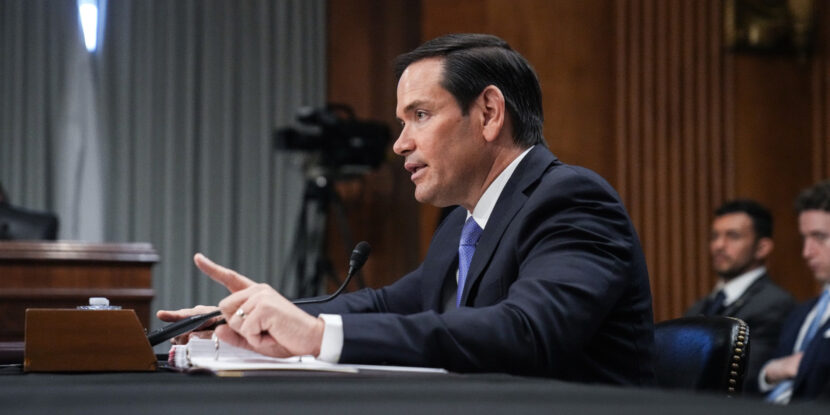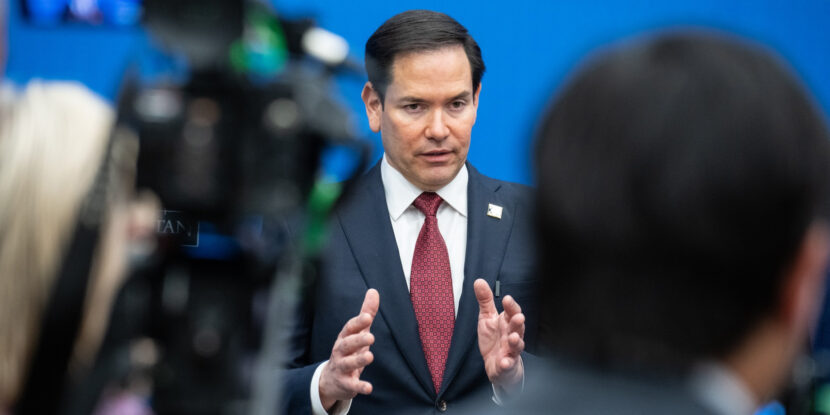
PULSE POINTS:
❓What Happened: Secretary of State Marco Rubio announced a new policy to block U.S. entry for foreign officials and their families involved in censorship of Americans or interference with U.S. tech companies.
👥 Who’s Involved: Secretary of State Marco Rubio, Vice President J.D. Vance, President Donald Trump, Brazilian Supreme Court Justice Alexandre de Moraes, and Representatives Maria Elvira Salazar (R-FL) and Darrell Issa (R-CA).
Your free, daily feed from The National Pulse.
📍 Where & When: United States, with the new policy announced in May and building on actions taken since Rubio assumed office, including the shutdown of the Global Engagement Center in April.
💬 Key Quote: “Foreigners who work to undermine the rights of Americans should not enjoy the privilege of traveling to our country,” Rubio posted on X.
⚠️ Impact: Visa bans could affect hundreds or thousands of foreign officials, targeting those enforcing censorship campaigns that violate free speech rights or coerce U.S.-based platforms.
IN FULL:
Secretary of State Marco Rubio has unveiled a sweeping policy to deny U.S. entry to foreign officials and their families involved in censorship campaigns targeting Americans or U.S.-based technology platforms. The policy, rooted in the Immigration and Nationality Act, aims to counter what Rubio describes as an expanding global censorship apparatus.
The initiative builds on Rubio’s actions since assuming office, including the April shutdown of the State Department’s Global Engagement Center (GEC). The GEC had faced criticism for funding organizations like the Britain-based Global Disinformation Index, accused of labeling dissenting views as misinformation. Rubio cited the GEC’s activities as incompatible with free speech principles.
The new visa restrictions target foreign judges, bureaucrats, regulatory officials, and others orchestrating censorship efforts. This includes those enforcing Europe’s Digital Services Act (DSA), which Rubio has criticized as an overreach compelling censorship on platforms like X (formerly Twitter), Meta, and Google. “Foreigners who work to undermine the rights of Americans should not enjoy the privilege of traveling to our country,” Rubio stated on X.
The British government, which is particularly censorship-prone, is especially concerned that officials from the communications regulator Ofcom will be targeted.
The policy’s foundation traces back to September 2024, when five Republican lawmakers urged then-Secretary of State Antony Blinken to impose visa bans on foreign officials suppressing speech rights. Their letter specifically named Brazilian Supreme Federal Court Justice Alexandre de Moraes and accused him of silencing opposition voices and targeting X under dubious legal pretenses. Representative Maria Elvira Salazar (R-FL), co-author of the letter, later introduced the “No Censors on our Shores Act” with Congressman Darrell Issa (R-CA), aiming to formalize such restrictions.
President Donald J. Trump and his administration have expressed increasing alarm over foreign governments pressuring U.S. companies to implement censorship exceeding American legal standards. Internal memos suggest the visa bans could apply to hundreds or even thousands of officials worldwide. Cases involving threats to arrest platform employees, freeze assets, or enforce foreign speech codes may fall under the policy’s scope.
The move aligns with the “America First Policy Directive” President Trump signed in January, prioritizing safeguarding U.S. speech rights abroad. Vice President J.D. Vance has also emphasized the administration’s commitment to opposing global censorship regimes, calling out European authorities for weaponizing laws to suppress political dissent.

PULSE POINTS:
❓What Happened: The Trump administration announced a visa ban targeting British officials involved in censoring American citizens, warning that foreign actors who trample free speech rights will no longer be welcome in the United States.
👤Who’s Involved: U.S. Secretary of State Marco Rubio, British media regulator Ofcom, Metropolitan Police Commissioner Mark Rowley, and Lucy Connolly, a British mother imprisoned for a social media post.
Your free, daily feed from The National Pulse.
🧾Key Quote: “We will not tolerate encroachments upon American sovereignty, especially when such encroachments undermine the exercise of our fundamental right to free speech,” said Rubio.
⚠️Fallout: British officials were blindsided by the announcement and are scrambling for answers from the White House, as pro-censorship authorities face mounting scrutiny from Washington.
📌Significance: The move marks a sharp escalation in the Trump administration’s effort to push back against globalist speech controls and defend the First Amendment from foreign interference.
IN FULL:
British government officials involved in censoring American citizens could soon be barred from setting foot in the United States under a sweeping new measure from the Trump administration. Secretary of State Marco Rubio announced the visa restrictions on Wednesday, directly targeting foreign bureaucrats and regulators deemed “complicit in censoring” Americans online.
The policy appears to be aimed at Ofcom, the British government media regulator responsible for enforcing the controversial Online Safety Act—a law that critics say enables sweeping censorship and punishes American tech companies with massive fines. Under the legislation, platforms that fail to remove so-called “harmful content” face penalties of up to £18 million (~$24.4 million) or 10 percent of annual revenue, placing U.S.-based firms in the crosshairs of British law.
“For too long, Americans have been fined, harassed, and even charged by foreign authorities for exercising their free speech rights,” Rubio said. “It is unacceptable for foreign officials to issue or threaten arrest warrants on U.S. citizens or U.S. residents for social media posts on American platforms while physically present on U.S. soil.”
The Trump administration has taken particular offense at the British government’s attempts to impose extra-territorial censorship, with Rubio adding: “It is… unacceptable for foreign officials to demand that American tech platforms adopt global content moderation policies or engage in censorship activity that reaches beyond their authority and into the United States.”
The announcement reportedly caught British officials off guard, with diplomats urgently seeking clarity from Washington. The warning comes just days after it was reported that the White House is actively “monitoring” the case of Lucy Connolly, a British mother sentenced to 31 months in prison for a social media post about a mass stabbing targeting young girls in Southport, England, perpetrated by the son of two African asylum seekers.
That case drew international concern after British officials threatened to prosecute or extradite Americans who violated their hate speech laws online. “We will throw the full force of the law at people,” warned Metropolitan Police Commissioner Sir Mark Rowley at the time. “Whether you’re in this country committing crimes on the streets or committing crimes from further afield online, we will come after you.”
In response, U.S. State Department officials from the Bureau of Democracy, Human Rights, and Labor traveled to London in March. The diplomats reportedly met with pro-life activists—imprisoned for as little as silently praying inside their heads near abortionist clinics under laws restricting freedom of expression and religion.
The Vice President has taken a personal interest in censorship in Britain and Europe more broadly, warning during a speech in Germany, “In Britain and across Europe, free speech, I fear, is in retreat.”
show less

 4 weeks ago
2
4 weeks ago
2








 English (US) ·
English (US) ·